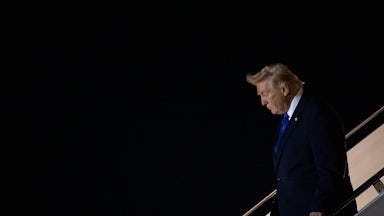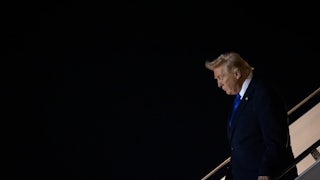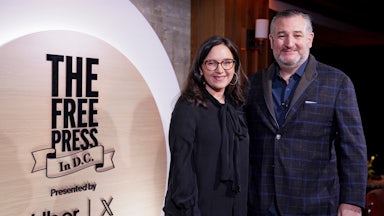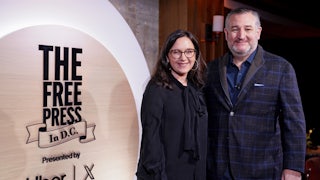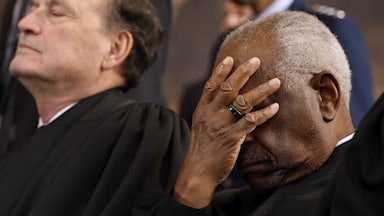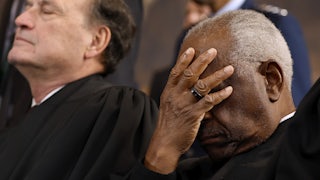Former Boston Globe and Washington Post editor Martin “Marty” Baron reemerged in the media discourse recently, after publishing an extensive defense of the notion of journalistic objectivity. It is a massive understatement to call Baron an incredible journalist and a man of deep integrity. As many a moviegoer knows, Baron led the Globe during its investigation of systemic sexual abuse by the city’s Catholic archdiocese and became a minor liberal icon during the Trump administration by standing up for press freedom.
So he has substantial credibility when it comes to matters of journalistic mores. But like the rest of the media, that doesn’t mean he gets everything perfectly right.
Baron writes, “When I defend objectivity, I am defending it as it was originally defined and defending what it really means. The true meaning of objectivity is not the straw man that is routinely erected by critics so that they can then tear it down.” Ah, but who is straw-manning whom? While what Baron is ultimately speaking out in favor of is largely unobjectionable, he ends up with an entirely different contention from the one he seemingly set out to make, arguing past the detractors of objectivity and responding to criticisms of concrete practices by reiterating his support for abstract ideals—which no one was disputing in the first place.
Baron asserts that (unspecified) critics of objectivity have three main objections: No one can be truly objective, so pretending to be objective is pointless; journalism necessarily requires judgment calls (whom to interview, how to frame a story, etc.), so subjectivity is baked in, like it or not; and objectivity “is just another word for … ‘on the one hand, on the other hand’ journalism.” He also asserts that critics believe objectivity is simply “the world seen from the White male perspective”—which, while accurate, elides the fact that since the professionalization of journalism, most reporters and pundits have been not just white and male but also upper-middle class, well-educated socialites—in a word, the bourgeoisie. I’m sure Baron would agree that race and gender aren’t the only aspects of identity that distort our perceptions, but he may not be as cognizant or cautious of this particular distortion.
However, the real problem comes when Baron mounts his defense. He writes that if one understands the ideals that underlie journalistic objectivity, the values that are being defended are obvious: Objectivity means a reporter approaches their work with an open mind, fully aware of their own biases, and possessed of “a willingness to listen, an eagerness to learn—and an awareness that there is much to know.”
Did you spot the little bit of bait and switch? Baron had described criticisms of the practice of objective journalism—things like blindness to one’s own biases, making value judgments for storytelling purposes, and bothsidesism—but only defended the ideals those practices in theory were meant to uphold. The only way his defense of objectivity would defeat the arguments of its critics would be if the critics were objecting to these underlying ideals.
But no one besides pure and unalloyed propagandists wants journalists to be more closed-minded or less willing to listen and learn. The problem is that journalism in practice has rarely followed these ideals. And one of the main reasons why has been a series of professional norms that journalists justify as part of objectivity but that reify the elite prism and its many distortions.
I know this phenomenon well because I co-lead a project focused on tracking mistruths in economics journalism. We’ve found that major news organizations routinely miseducate the public about well-established principles in economics—products often forged in the fires of “objectivity.”
There’s the media’s decades-long obsession with the size of the national debt, a number that, on its own, no serious economist cares about whatsoever—it only matters in comparison to other data like gross domestic product or interest rates. There’s the media’s total disinterest in skeptical reporting on the Federal Reserve, considered the single most powerful economic institution on earth. The Fed intensely controls press access and only gives scoops to its favored reporters, and the entire press corps just goes along with it.
The biggest problem is the overreliance on financially conflicted, frequently wrong sources. Perhaps the biggest fish in this particular pond is former Treasury Secretary Larry Summers, who sells his advice to financial technology (“fintech”) companies yet opines on finance every Friday evening on BloombergTV’s Wall Street Week program—and, to the best of my knowledge, has never disclosed his business relationships to viewers. Oh, and he led the charge to bail out the Silicon Valley Bank depositors, who were disproportionately involved in the fintech industry.
Summers isn’t alone. My colleague Vishal Shankar has documented a trend of housing journalists turning to literal lobbyists for landlords for independent analysis on housing policies. Former Fed Vice Chair Richard Clarida resigned amid an alleged insider trading scandal and is now a regular on CNBC. And how many times has Steven Rattner written for The New York Times or gabbed on Morning Joe without disclosing that he settled $16.5 million worth of lawsuits for running a pay-to-play scheme with the New York state pension fund?
At every level, the state of mainstream American economics reporting is obscene. But all of these problems are related to the mandates of objectivity.
News outlets keep turning to Summers because “former treasury secretary” sure sounds to some like “qualified expert.” And under the rules of objectivity, even if a journalist has a hunch that an expert is spewing crock, the journalist has to take the source seriously if they can’t empirically prove that they’re pitching pure crackpot on their pages.
The theory goes that reporting Summers’s words uncritically is the best way to ultimately test their validity, since his fellow economists can read them and explain if he’s right or wrong. The problem is that his fellow economists have—for decades, over and over, nonstop—gone to Herculean efforts to identify Summers as a hack par excellence. Nevertheless, his reputation remains intact. Why? Because Summers just dismisses his peers as partisan actors and proclaims that he’s the one practicing “economic science.” According to Summers, his critics are the actually biased and misleading ones. He’s simply explaining “facts” informed by his economics training, and if other people don’t like it, it means they’re economically illiterate.
This is nonsense: Economists argue about their discipline constantly, and like all social sciences, it involves far more theory than empirical law. But because Summers can perpetuate a controversy over his views, the objective journalist must continue to offer a platform to both sides. And so the cycle repeats.
Other flaws in the practice of objectivity underlie the federal debt hysteria. It’s well accepted by now that Republican politicians use the debt as a fig leaf for their total hostility to Democratic bills. But objectively, the federal debt is rising and, objectively, some politicians in both parties say it’s a serious problem. The question is whether those politicians are right.
This would require making a real live value judgment, which objective journalists claim they must never make. But plenty of other issues don’t attract half as much media coverage as the debt, from smog regulation to de-unionization to Defense Department fraud.
Why? Because if the debt were important, then covering it would flatter how journalists perceive themselves: It’s an ugly truth that politicians like to ignore, it gives license to criticize both major parties, it theoretically affects every taxpayer’s pocketbook, and it’s the stated cause of dramatic standoffs in Congress. If only the basic mechanics of federal debt actually worked how journalists wish it did.
Baron would likely object the most to the idea that the press’s deference to the Fed is a by-product of objectivity. But access journalism persists across the mainstream media for a reason. The thoughts and opinions of Fed governors are indisputably newsworthy, and journalists aren’t supposed to enter any reporting project with the goal of attacking a source, right? If the first duty of a journalist is to seek out the news and report it, and being friendly with powerful sources is the only way to get important news, aren’t reporters obliged to get the scoops they can by the most effective means?
Most people agree that access journalism violates the principles of objectivity, but in the moment, individual cases often feel justifiable under the standard. Explicit quid pro quos are rare. Like most corruption, the issue tends to result from an alignment of incentives, a need to compromise for a greater good, and fear of competitors gaining an advantage. And sometimes, as at the Fed, the journalist who implicitly trades their integrity for information gets to become “a kind of economic indicator in [their] own right,” in the words of New York magazine.
Again, this points to the wide gap between journalistic theory and practice. In theory, all reporters should be skeptical and independent, and dig as deep as necessary to get the story right. In practice, journalism is a business, and a business that’s been deep in the hole for decades now. Something’s got to keep the click-throughs high to keep the ad buys rolling in, and investigative reporting happens on its own timeline—editors can’t depend on investigations to fill up a paper every day by deadline.
Journalists and the public agree that reporters getting too close to their sources is a dire problem. It is one of the principal issues that objectivity is supposed to prevent. If objectivity alone could do so, would we still have this problem 100 years after Walter Lippmann first developed the principle? Baron would likely say that these miscarriages of the journalistic mission aren’t failures of objectivity but examples of what objectivity is not. “Our failures are not ones of principle. They were failures to live up to principle,” Baron writes.
To Baron, objectivity cannot fail. It can only be failed. He’s fallen for an informal logical fallacy alternately known as the appeal to purity or the “no true Scotsman” fallacy: If the only determinant of objectivity is his personal judgment, then the standard isn’t measurable to an outsider.
Baron claims that no objective journalist would engage in “false balance” or “ignoring or soft-pedaling the revelations of our reporting.” But self-described objective journalists do both all the time. The New York Times’ obsession with scrutinizing gender-affirming care for teenagers is nothing but falsely balancing for trans rights activism. CNBC giving talk-show time to former Fed Vice Chair Richard Clarida directly ignores his numerous trading scandals.
Baron claims no objective journalist would appoint themselves a moral authority or fail to acknowledge their own limitations. But across the media, coverage of the federal debt often takes a paternalistic, scolding tone about something for which most Americans are not responsible. And what was the Iraq War but one massive failure of journalists to acknowledge the limitations of the Bush administration’s arguments and their own willingness to independently verify information?
By Baron’s standards, almost none of the journalists who proclaim themselves practitioners of objectivity actually are “objective” in any measurable way. Moreover, it’s telling that Baron’s only examples of properly executed objective journalism are the greatest hits of the profession: the Watergate scandal, the Pentagon papers, and, of course, the Spotlight reports.
But if the only positive examples of objectivity are multiyear, resource-intensive, Pulitzer-winning and history-shaping investigations (which are later adapted into Oscar-nominated newspaper procedurals), that doesn’t help us to apply objectivity to the daily grind of political, economic, and cultural reporting. And if objectivity constantly fails in that daily grind, then maybe objectivity—at least, as it’s practiced today—just isn’t a very useful rubric.
That doesn’t mean that the ideals it means to uphold—such as open-mindedness and the willingness to learn new things—are bad. Far from it. However, by the sixtieth time you’ve asked Larry Summers to sound off on the news of the day or recited the same old blank incantation about the national debt, perhaps it’s time to admit that you’re not as open to new ideas as you believe yourself to be. Critics of objectivity ask us to think beyond the standard precisely because they want an intellectually humble, deeply self-aware, conscientious, and generous-minded press—not a numbingly repetitive engine of threadbare conventional wisdom.
By looking hard at the media’s systemic failings, instead of just dismissing them as unobjective, we can figure out why these failings occur and try to systematically change things for the better. The world and the news media are both dramatically different from when Lippmann first articulated objectivity in 1920. We can take the best of Lippmann’s ideas, examine how 100 years of practice have tested and altered them, and figure out new steps for journalism to take in their wake.
“The answer to our failures as a society and as a profession is not to renounce principles and standards,” Baron writes. But point me to the critic of objectivity who wants a more deluded, less curious, unrigorous press. The goal is not to erase the progress objectivity has made. It is to let the practice of journalism advance, grow, and flourish.

